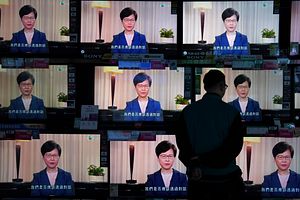Hong Kong leader Carrie Lam said Tuesday that clashes between protesters and police last weekend have dampened her hopes that a recent lull in violence would allow the territory’s economy to recover.
The government will soon launch a fourth round of measures to support business, protect jobs, and offer economic relief, she told reporters after a weekly meeting with advisers.
Six months of unrest have tipped Hong Kong’s already weak economy into recession. The pro-democracy protests have become more violent over time as the government has refused to give ground on most of the movement’s demands.
The last two weeks have been relatively quiet, as activists focused on winning district council elections that became a referendum on public support for the protests.
Pro-democracy candidates won a landslide victory in the November 24 elections.
Police used tear gas and pepper spray balls in skirmishes last weekend, as protesters blocked streets and vandalized some shops seen as sympathetic to Beijing. Hong Kong is a semi-autonomous territory of China.
The clashes were much smaller than earlier ones, but Lam said they threw cold water on her hopes that the relative peace would hold.
“Again, we’re seeing violent scenes that we don’t want to see anymore,” she said.
Lam also said a new U.S. law to defend human rights in Hong Kong will have an economic impact, undermining confidence and creating an uncertain business environment.
The Hong Kong Human Rights and Democracy Act requires an annual review of the favorable trading status that the United States grants to the city. President Donald Trump signed it into law last week.
“We have freedom of the press, freedom of assembly, religious freedom – we enjoy a high degree of freedom in many areas,” Lam said. “There’s an overseas government that interfered with Hong Kong affairs, and that is most regrettable.”
New York-based Human Rights Watch said it regrets a decision by China to sanction it and other American rights and pro-democracy groups in retaliation for the approval of the U.S. legislation.
Foreign ministry spokeswoman Hua Chunying didn’t specify what the sanctions would be, but said the organizations had “performed badly” in the Hong Kong unrest.
The National Endowment for Democracy, the National Democratic Institute, the International Republican Institute, and Freedom House were also named in the Monday announcement.
“Rather that target an organization that seeks to defend the rights of the people of Hong Kong, the Chinese government should respect those rights,” Kenneth Roth, the executive director of Human Rights Watch, said in a statement.
Human Rights Watch said it has repeatedly urged Hong Kong police not to use excessive force to suppress peaceful protests, while also calling on protesters and those opposed to them to refrain from violence.
It has also urged the establishment of an independent commission to investigate police actions, one of the protesters’ demands.
China said it would also suspend visits by U.S. military ships and aircraft to Hong Kong. Navy ships occasionally make port calls during Pacific tours, and China has blocked them in the past during periods of tension.
“Beijing’s tantrum doesn’t change anything,” said U.S. Senator Ben Sasse. “The U.S. Navy didn’t spank the Chinese Communist Party in last week’s elections, the people of Hong Kong did.”
By Ken Moritsugu for The Associated Press. Associated Press journalist Dake Kang contributed to this story.

































